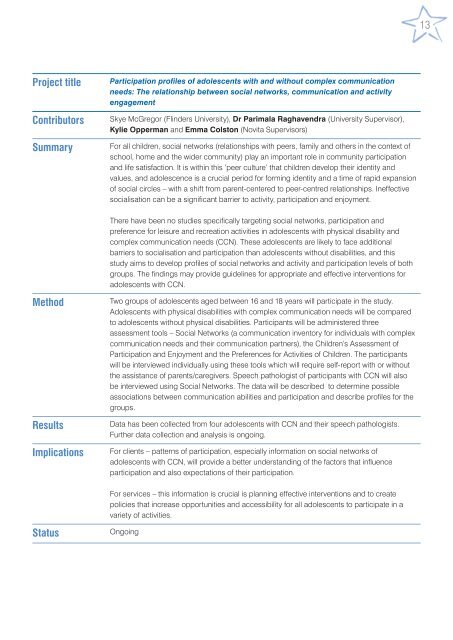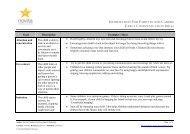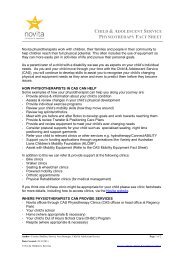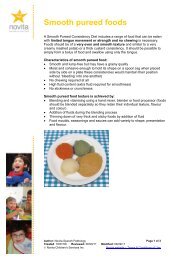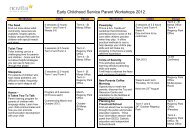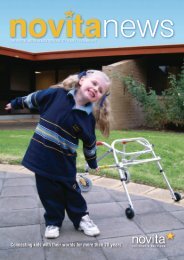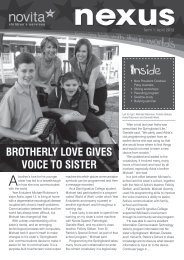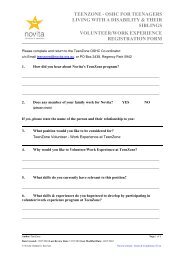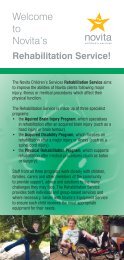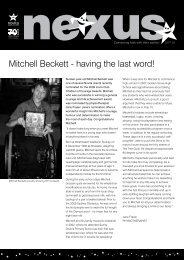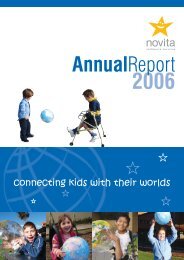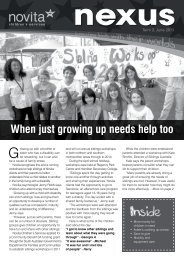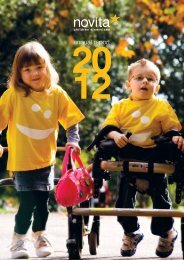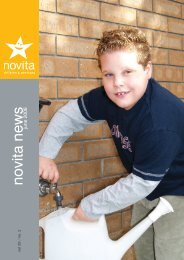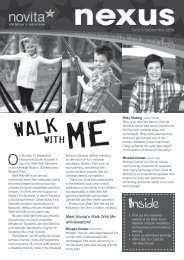Novita Research Report - 2004 to 2007 - Novita Children's Services
Novita Research Report - 2004 to 2007 - Novita Children's Services
Novita Research Report - 2004 to 2007 - Novita Children's Services
- No tags were found...
You also want an ePaper? Increase the reach of your titles
YUMPU automatically turns print PDFs into web optimized ePapers that Google loves.
13Project titleContribu<strong>to</strong>rsSummaryParticipation profiles of adolescents with and without complex communicationneeds: The relationship between social networks, communication and activityengagementSkye McGregor (Flinders University), Dr Parimala Raghavendra (University Supervisor),Kylie Opperman and Emma Cols<strong>to</strong>n (<strong>Novita</strong> Supervisors)For all children, social networks (relationships with peers, family and others in the context ofschool, home and the wider community) play an important role in community participationand life satisfaction. It is within this ‘peer culture’ that children develop their identity andvalues, and adolescence is a crucial period for forming identity and a time of rapid expansionof social circles – with a shift from parent-centered <strong>to</strong> peer-centred relationships. Ineffectivesocialisation can be a significant barrier <strong>to</strong> activity, participation and enjoyment.There have been no studies specifically targeting social networks, participation andpreference for leisure and recreation activities in adolescents with physical disability andcomplex communication needs (CCN). These adolescents are likely <strong>to</strong> face additionalbarriers <strong>to</strong> socialisation and participation than adolescents without disabilities, and thisstudy aims <strong>to</strong> develop profiles of social networks and activity and participation levels of bothgroups. The findings may provide guidelines for appropriate and effective interventions foradolescents with CCN.MethodResultsImplicationsTwo groups of adolescents aged between 16 and 18 years will participate in the study.Adolescents with physical disabilities with complex communication needs will be compared<strong>to</strong> adolescents without physical disabilities. Participants will be administered threeassessment <strong>to</strong>ols – Social Networks (a communication inven<strong>to</strong>ry for individuals with complexcommunication needs and their communication partners), the Children’s Assessment ofParticipation and Enjoyment and the Preferences for Activities of Children. The participantswill be interviewed individually using these <strong>to</strong>ols which will require self-report with or withoutthe assistance of parents/caregivers. Speech pathologist of participants with CCN will alsobe interviewed using Social Networks. The data will be described <strong>to</strong> determine possibleassociations between communication abilities and participation and describe profiles for thegroups.Data has been collected from four adolescents with CCN and their speech pathologists.Further data collection and analysis is ongoing.For clients – patterns of participation, especially information on social networks ofadolescents with CCN, will provide a better understanding of the fac<strong>to</strong>rs that influenceparticipation and also expectations of their participation.For services – this information is crucial is planning effective interventions and <strong>to</strong> createpolicies that increase opportunities and accessibility for all adolescents <strong>to</strong> participate in avariety of activities.StatusOngoing


